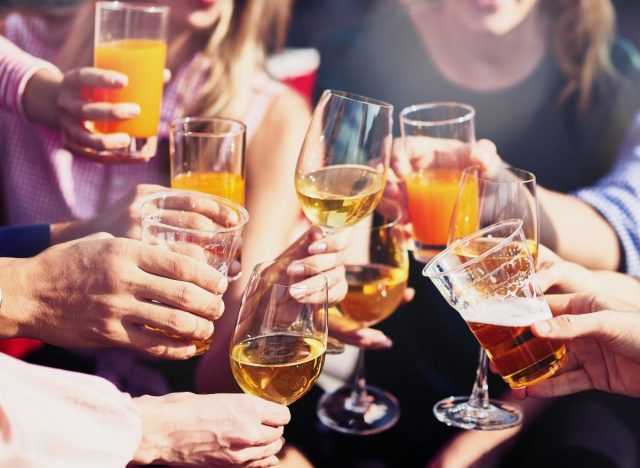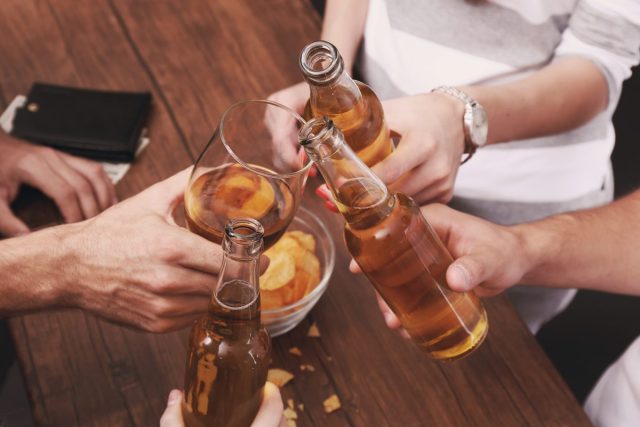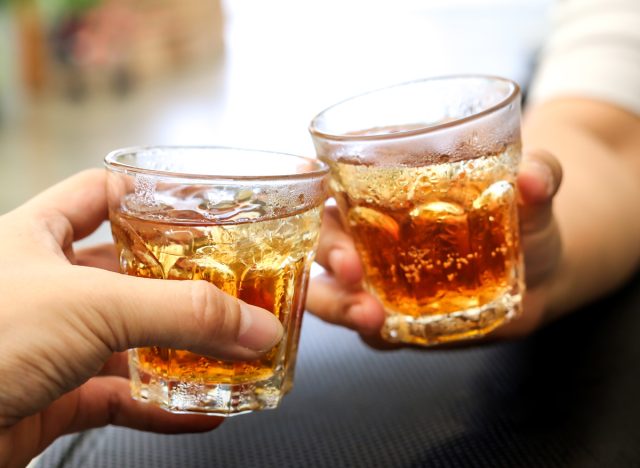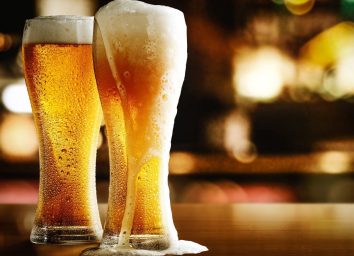Surprising Side Effects of Drinking Alcohol After 50, Say Dietitians

Drinking small amounts of alcohol can sometimes bring on positive health effects. In fact, many of the oldest people across the globe sip on red wine on a regular basis! But while smaller or moderate amounts of alcohol may be harmless to most, there are still side effects of drinking as you age to look out for.
To learn more about this, we talked with a few expert dietitians to get their take on the potential negative side effects of drinking alcohol after the age of 50. After, for more healthy drinking tips, check out The 25 Worst Beers in the World.
It may cause weight gain.

A common side effect of drinking too much alcohol after 50 is possible weight gain.
“As we age our metabolism, unfortunately, slows down. That means we do not need as many calories to maintain our weight. Because alcohol contains calories, continuing to drink the amount you once did when you were younger might actually cause weight gain due to extra calories. If you like a glass of wine or drink at dinner, make sure you are calculating those calories into your eating plan,” says Amy Goodson, MS, RD, CSSD, LD author of The Sports Nutrition Playbook and member of our expert medical board.
It might raise triglycerides.

Drinking heavier amounts of alcohol can not only increase your chances of gaining weight, but it may impact your heart health, too.
“While moderate drinking (one drink a day for women and two drinks a day for men) might actually have a heart health benefit by increasing your HDL, or good cholesterol, drinking more heavily can actually have the opposite effect and cause an increase in triglycerides,” says Goodson.
It might reduce muscle recovery after exercise.

One side effect of drinking that many people may not realize is that it can hinder your exercise goals and recovery process.
“Alcohol can slow down the repair process of exercise-induced muscle damage by inhibiting the functions of hormones that usually aid this process like testosterone. That means it can delay recovery and you being strong and ready for the next workout,” says Goodson.
It can make you dehydrated.

Another way alcohol can impact your health and workout recovery time is through dehydration.
“Diuretic-type beverages, such as alcohol, can promote increased water losses that lead to dehydration and prevent muscle recovery in active adults, especially after workouts,” says Rachel Fine, RDN with To The Pointe Nutrition.
It can alter your gut health.

Your gut can be negatively impacted by drinking alcohol, especially when consumed in large quantities on a regular basis.
“While some research shows that low to moderate consumption of red wine promotes the growth of beneficial bacteria, it’s also clear that excess alcohol negatively affects gut health,” says Katelin Maidment, RD with Eternal Wellness. “An article published in Alcohol Research reported that ‘in large amounts, alcohol and its metabolites can overwhelm the gastrointestinal tract (GI) and liver and lead to damage both within the GI and in other organs.’ Alcohol promotes inflammation in the gut, leading to an overgrowth of pathogenic bacteria and increasing intestinal permeability, also known as ‘leaky gut.’ This allows toxins and foreign invaders to leak into the bloodstream, causing further inflammation and other health issues.”
It can impair digestions and absorption of nutrients.

Drinking alcohol on a regular basis in larger amounts can impact your digestion in negative ways.
“Alcohol impairs the body’s ability to break down foods properly by decreasing the secretion of digestive enzymes from the pancreas,” says Maidment. “When food isn’t digested into smaller, absorbable molecules, the body isn’t able to absorb the nutrients from these foods, and as a consequence this can result in nutrient deficiencies and low energy. Not only does alcohol impair the digestion and absorption of nutrients, but it also causes important vitamins and minerals to be excreted through the urine, contributing to further nutrient deficiencies.”
It might deplete your energy levels.

And lastly, excessive drinking can rob you of your energy immediately after you drink and over time as well.
“According to an article published in Alcohol Research & Health, alcohol promotes the production of inflammatory free radicals, which damage the energy-producing organelles in our cells called mitochondria,” says Maidment. “This results in decreased ATP production, and ultimately decreased energy levels because ATP is the body’s form of energy. In addition, the body requires extra oxygen and energy to metabolize alcohol, which depletes energy levels and is one of the reasons you may feel so tired after drinking.”








